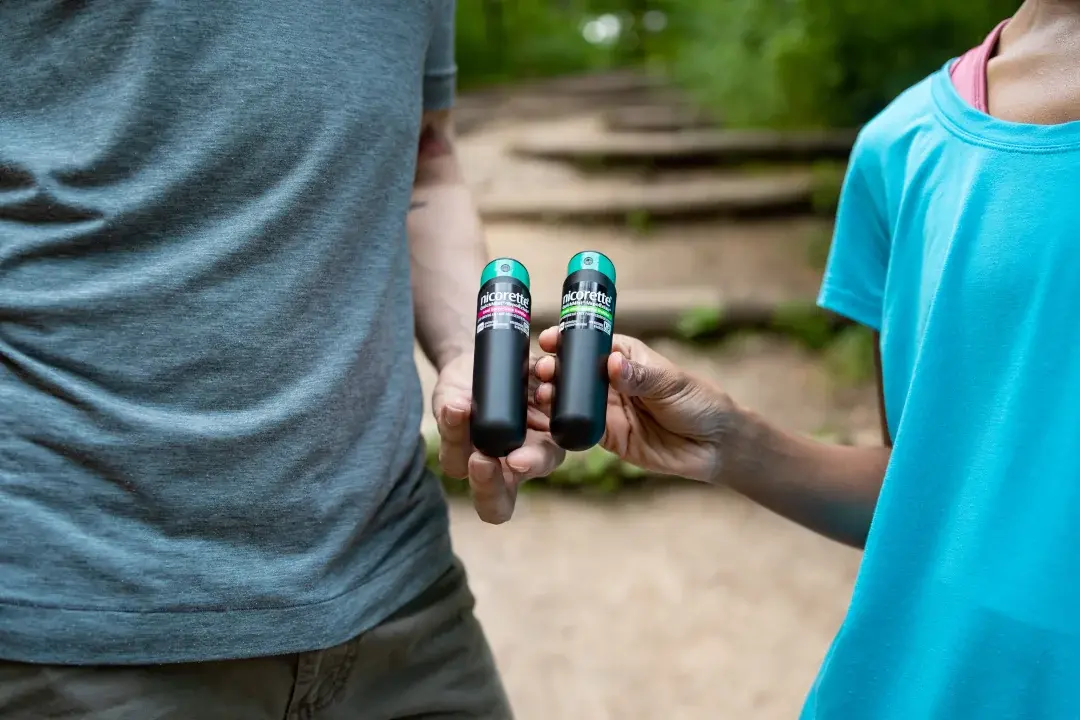Nicotine and Addiction
Nicotine is the main reason people become addicted to tobacco products. This is because nicotine increases the release of chemicals in your brain that help regulate mood and behavior, particularly dopamine.1
How does Nicotine Replacement Therapy (NRT) Work?
NRT works by replacing some of the nicotine normally provided by smoking cigarettes, this helps reduce cravings and withdrawal symptoms for those quitting smoking. NRTs are able to supply nicotine without the hundreds of harmful chemicals found in cigarette smoke. With NRTs, you are also able to gradually decrease the amount of nicotine you get over time, allowing you to take control during your quitting journey.2
Now that you know more about Nicotine and NRT, you can replace common misconceptions with the facts about nicotine and Nicotine Replacement Therapy (NRT).
Does Nicotine cause cancer?
Nicotine hasn't been proven to cause cancer.
There are more than 7,000 other chemicals in cigarette smoke, many of which are known to cause cancer.3
Smoking can increase your risk for cancer of the mouth and throat, esophagus, stomach, colon, rectum, liver, pancreas, voicebox (larynx), trachea, bronchus, kidney and renal pelvis, urinary bladder, and cervix, and causes acute myeloid leukemia.4
Smoking is linked to about 80-90% of lung cancer cases in Canada.5 People who smoke cigarettes are 15 to 30 times more likely to get lung cancer or die from lung cancer than people who do not smoke.5 In addition, the more frequent and longer periods someone smokes for, the more risk they have of developing lung cancer. Second-hand smoke, too can increase your risk of lung cancer.5
Is Nicotine the cause of other smoking-related diseases?
Nicotine is not the cause of other smoking related diseases.6
It is the number of toxins in cigarette smoke, rather than the nicotine content, that are the cause of diseases like chronic lung disease and heart disease.
Examples of toxic chemical components include Acetone, Arsenic, Benzene, Cadmium, Carbon Monoxide, Formaldehyde, Methanol and Tar.3
Will I gain weight if I quit smoking?
Individual responses to quitting smoking actually range from weight loss to weight gain. To minimize weight gain when quitting, focus on eating healthy and staying active with exercise.7
Does Nicotine cause yellow stains on fingers and teeth?
The tar in cigarettes is what causes the unsightly yellow-brown stains on fingers and teeth, not the nicotine.6
Is Nicotine a man-made substance?
Nicotine is a naturally occurring substance derived from the Nicotiana (Tobacco) plant.6
Does NRT substitute one addiction for another?
NRT provides a lower dose of nicotine in comparison to cigarettes. The dose is slowly decreased over time until you can gradually give up nicotine for good.2
Is NRT a 'cure' for smoking?
NRT products, like NICORETTE®, don't cure smoking and they won't magically transform you from a smoker to a non-smoker overnight. However, they will make quitting smoking easier by relieving your difficult cravings.2 Of course, quitting will still require your willpower and effort.




